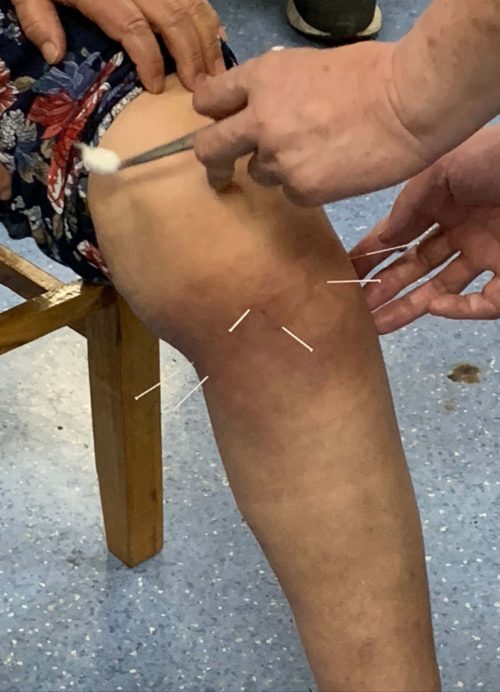
A patient receiving acupuncture for osteoarthritis
The study, published in the journal Acupuncture in Medicine, included 90 people with an average age of 71 who had knee pain because of osteoarthritis. Their osteoarthritis was severe enough to merit surgery, but only a little more than half — 50 of them — said that they would actually be prepared for surgery. Twenty-nine of them said they would not have surgery, and four of them said that they would have surgery, but only as a final option.
The study participants received weekly acupuncture treatments for a month, followed by treatments every six weeks thereafter. Not all the study participants received acupuncture for the same amount of time — by the time a year had passed, 41 of them were still receiving it; by the time two years had passed 31 were still receiving it. However, the average number of sessions each study participant had gone through was 16.5. The British researchers found that undergoing acupuncture treatments for one month seemed to decrease pain and stiffness that comes with osteoarthritis. Plus, the benefits continued over the two-year period. This is not the first time acupuncture has been identified as a possible treatment for osteoarthritis symptoms.
A 2004 study in the same journal also showed that pain symptoms were decreased when study participants either received acupuncture or acupuncture plus medications. So what exactly is it about acupuncture that seems to provide its healing effects? Experts still aren’t totally sure. “We know it works, we just don’t know why,” Dr. Leena Mathew, an attending physician in Anesthesiology and Pain Medicine at New York-Presbyterian Hospital/Columbia University Medical Center, told The Atlantic last year. “It’s very hard to translate into a Western language.”
Resources:
– SOURCE: Amanda L. Chan
http://www.huffingtonpost.com/2012/08/24/acupuncture-osteoarthritis-knee…